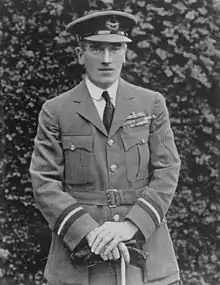Francis Rowland Scarlett
Air Vice Marshal Francis Rowland Scarlett, CB, DSO (18 May 1875 – 15 April 1934) was a senior Royal Air Force commander.
Francis Rowland Scarlett | |
|---|---|
 Air Commodore Francis Scarlett c.1919–24 | |
| Born | 18 May 1875 |
| Died | 15 April 1934 (aged 58) |
| Allegiance | United Kingdom |
| Service/ | Royal Navy (1889–1918) Royal Air Force (1918–31) |
| Years of service | 1889–1931 |
| Rank | Air Vice Marshal |
| Commands held | RAF Middle East (1929–31) Fighting Area (1929) Air Defence of Great Britain (1928–29) Coastal Area (1924–28) RAF Halton (1919–24) No. 1 School of Technical Training (1919–24) No. 12 Group (1919) RNAS Eastern Mediterranean (1916–17) |
| Battles/wars | First World War |
| Awards | Companion of the Order of the Bath Distinguished Service Order Mentioned in Despatches Commander of the Order of the Redeemer (Greece) |
Early and family life
Francis Rowland Scarlett was born on 18 May 1875, the son of Lieutenant Colonel William James Scarlett. At the age of 29 he married Dora Blakiston-Houston, the daughter of John Blakiston-Houston,[1] an Irish Unionist Party politician. He was the father of Air Vice Marshal James Rowland Scarlett-Streatfeild who was killed serving in the Second World War.
Military career
Scarlett joined the Royal Navy in (or around) 1891, and held the rank of lieutenant when in July 1902 he was posted as 1st lieutenant on the training ship HMS Caledonia, anchored at the Firth of Forth.[2] In April 1913 he attended the Central Flying School, being awarded his Aviator's Certificate no. 468 on 4 April 1913.[3] He served in the First World War as the Inspecting Captain of Aircraft, of Air Stations and then of Air Training, gaining a promotion to wing captain at the close of 1915.[3] In February 1916 he became Commander of all Royal Naval Air Service units in the Eastern Mediterranean and in May 1919 he was given command of No. 12 Group.[3] He was created a Commander of the Greek Order of the Redeemer.[4]
In December 1919 became was made Officer Commanding the No. 1 School of Technical Training at RAF Halton and on 22 January 1920, he was awarded a permanent commission in the RAF.[3] He went on to be Air Officer Commanding Coastal Area in 1924, Air Officer Commanding Air Defence of Great Britain (on a temporary basis) in 1928 and Air Officer Commanding Fighting Area in January 1929.[3] His last appointment was as Air Officer Commanding Middle East Command in October 1929 before he retired in the rank of air vice marshal in December 1931.[3]
References
- The Peerage.com
- "Naval & Military intelligence". The Times (36810). London. 3 July 1902. p. 8.
- Air of Authority – A History of RAF Organisation – Air Vice-Marshal F R Scarlett
- Smith, Gordon (29 December 2010). "FOREIGN DECORATIONS AWARDED TO ROYAL NAVY, London Gazette editions January 1918 – December 1920". Naval-History.Net. Retrieved 2 July 2011.
| Military offices | ||
|---|---|---|
| New title | Inspecting Captain of Air Training 1915–1916 |
Succeeded by Harold Briggs |
| Preceded by Frederick Sykes |
Officer Commanding RNAS Eastern Mediterranean 1916–1917 |
Succeeded by Unknown |
| Preceded by Harold Briggs |
General Officer Commanding No. 12 Group 1919 |
Vacant Title next held by John TyssenIn 1937 |
| Preceded by New creation |
Commandant, No. 1 School of Technical Training 1919–1924 |
Succeeded by Charles Lambe |
| Preceded by Vyell Vyvyan |
Air Officer Commanding Coastal Area 1924–1928 |
Succeeded by Charles Lambe |
| Preceded by Sir John Salmond |
Commander-in-Chief Air Defence of Great Britain 1928–1929 |
Succeeded by Sir Edward Ellington |
| Preceded by Tom Webb-Bowen |
Air Officer Commanding RAF Middle East 1929–1931 |
Succeeded by Cyril Newall |